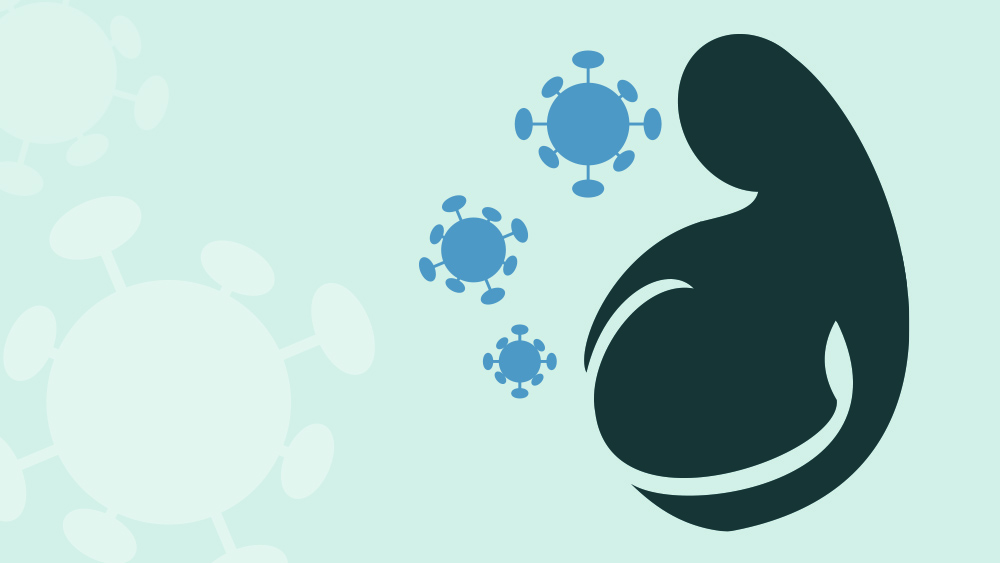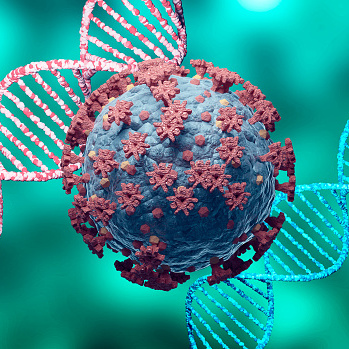Article Highlights
-
Pregnant people develop high levels of protective antibodies after vaccination against COVID-19.
-
Antibodies can be transferred to the fetus during pregnancy and to the newborn through breastmilk.
-
Transferred antibodies may protect babies from COVID-19 for months.
Meg Clark, CNP, M.S.N., a nurse practitioner in Boston, and her husband were excited to learn she was pregnant during the summer of 2020. But they had some mixed feelings.
Clark was at high risk for getting COVID-19, because she performs medical procedures on COVID-19 patients. Yet her options for preventing COVID-19 were limited.
“At first, there weren’t any COVID-19 vaccines, and then when they were available, there wasn’t any information about their safety during pregnancy and whether they even worked in pregnant people,” Clark said. “Decisions about vaccination were not clear-cut.”
Thanks to NIH-supported research like the study led by Andrea G. Edlow, M.D., M.Sc., a faculty member at Harvard Medical School and a maternal-fetal medicine specialist at Massachusetts General Hospital, people who are pregnant can now feel confident about getting vaccinated against SARS-CoV-2, the virus that causes COVID-19.1
Clark was one of 84 pregnant women who participated in Edlow’s study, which was supported by several parts of NIH, including the Eunice Kennedy Shriver National Institute of Child Health and Human Development.
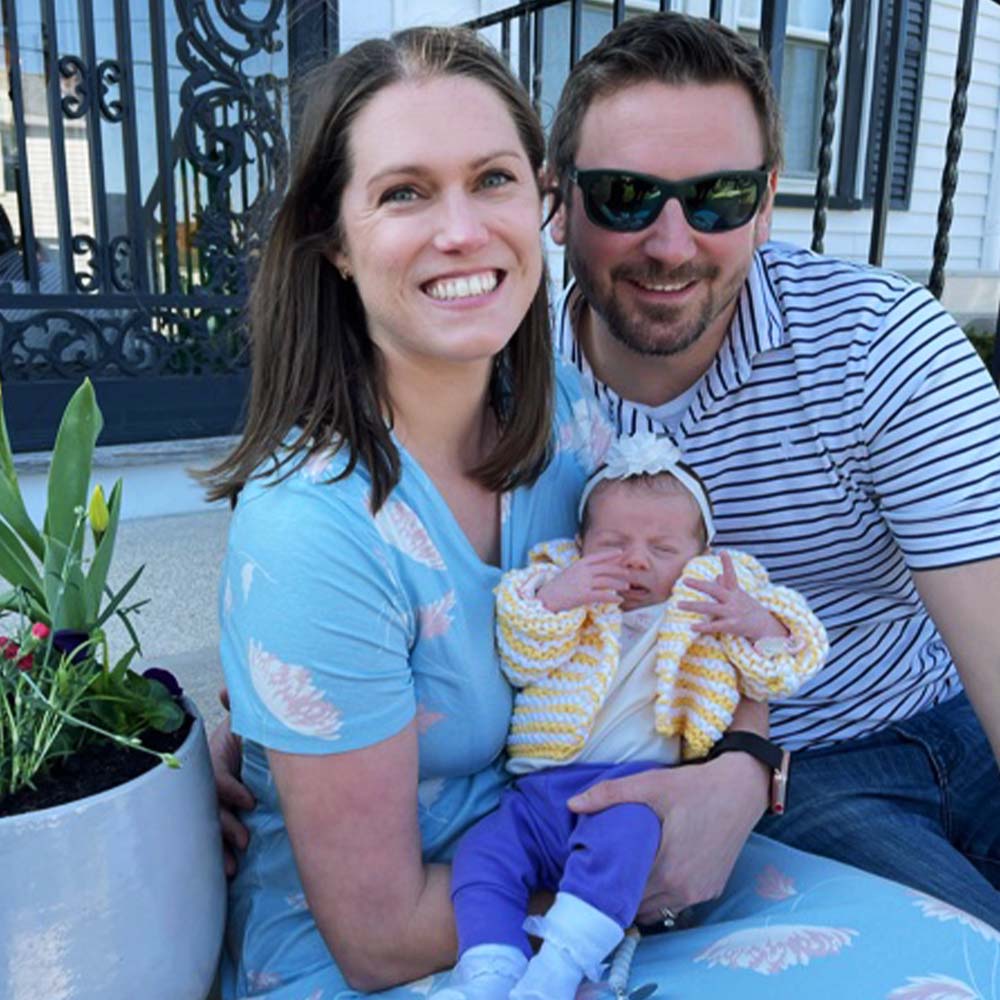
Meg and Adam Clark with baby Noelle. Meg opted to get vaccinated as soon as she could, and she participated in Edlow’s study. As a nurse practitioner, she was relieved to learn that vaccination helped protect both her and Noelle from getting COVID-19. Photo courtesy of Cate Tompkins.

Meg and Adam Clark with baby Noelle. Meg opted to get vaccinated as soon as she could, and she participated in Edlow’s study. As a nurse practitioner, she was relieved to learn that vaccination helped protect both her and Noelle from getting COVID-19. Photo courtesy of Cate Tompkins.
Answering Questions with Research
“With outbreaks of new diseases like COVID-19, I worry about possible effects on pregnancy and whether pregnancy might worsen symptoms,” Edlow said. “When the COVID-19 pandemic began, no one knew how the virus affects pregnancy.”
It turns out that Edlow was right to worry about the effects of SARS-CoV-2. Although most pregnant people do fine if they get COVID-19, studies showed that pregnancy increases the risk of severe disease and death.2
When the U.S. Food and Drug Administration authorized the first COVID-19 vaccines in December 2020, many people wondered about the vaccines’ effects during pregnancy.
“No special pregnancy concerns had shown up in animal tests of the COVID-19 mRNA vaccines,” Edlow said. “But we didn’t have any ‘gold-standard’ evidence from human studies on the use of vaccines during pregnancy.”
Edlow sought to get the information pregnant people need by checking antibody responses to the Pfizer and Moderna mRNA vaccines in pregnant, nonpregnant, and lactating women. For women who gave birth during the study, the researchers also looked for antibodies in samples of breastmilk and in umbilical cord blood.
A total of 131 women (84 pregnant, 31 lactating, and 16 nonpregnant women) who were planning to get vaccinated volunteered for the study. (Vaccinations were not given as part of the research.) Blood samples from 37 unvaccinated women who had COVID-19 infections during pregnancy were also tested. The study included a questionnaire asking about side effects of vaccination.

How COVID-19 Affects Pregnancy
Should you get the vaccine during pregnancy? Does the vaccine cause infertility? NIH research is helping to answer these questions and more.
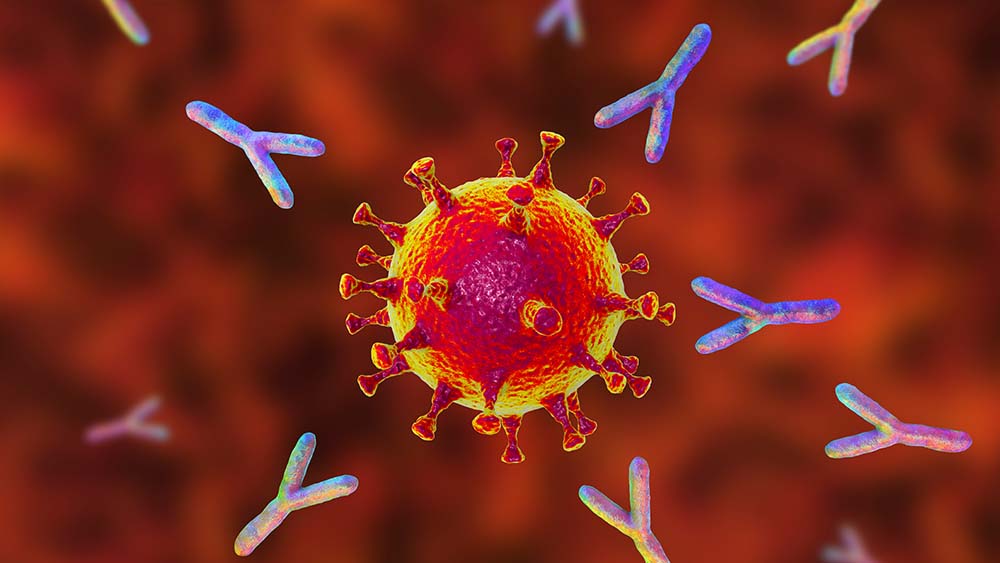
Antibodies help defend the body against invading microbes. Vaccination or natural disease stimulates the immune system to make antibodies targeted to the infection. This illustration shows the SARS-CoV-2 virus surrounded by Y-shaped antibody molecules that will inactivate the virus and prevent it from invading lung cells.

Antibodies help defend the body against invading microbes. Vaccination or natural disease stimulates the immune system to make antibodies targeted to the infection. This illustration shows the SARS-CoV-2 virus surrounded by Y-shaped antibody molecules that will inactivate the virus and prevent it from invading lung cells.
Vaccines Are Safe and Effective for Pregnant People
Edlow’s study results showed vaccination is safe during pregnancy.
“Vaccination is not associated with miscarriage or preterm birth or infertility,” Edlow explained. “Side effects are minor and similar to those reported by people who aren’t pregnant. Possible vaccine side effects should not deter women from getting vaccinated.”
Women who were vaccinated while pregnant developed enough antibodies to protect them from infection — that is, the vaccine worked.
“We learned that vaccination during pregnancy stimulates strong immune responses in women,” Edlow explained. “This is important new knowledge since the vaccines were not originally tested in pregnant people.”
The research team also compared antibody levels in women who were vaccinated while pregnant and antibody levels in unvaccinated pregnant women who got COVID-19. The women who had COVID-19 had weaker antibody responses than women who were vaccinated.
Vaccinating pregnant people may also benefit their babies.
“Antibodies go from the mother’s bloodstream to the placenta and then travel through the umbilical cord to the fetus,” Edlow said. “The antibodies may protect the baby for six months or more after birth.”
In addition, the study showed that the mother’s antibodies make their way into her breastmilk, likely protecting infants from COVID-19 for at least a few days after they consume the milk.
In late September 2021, the Centers for Disease Control and Prevention (CDC) issued an urgent health advisory to increase vaccination among pregnant people and people who may become pregnant. At that time, less than one-third of pregnant women had been vaccinated against COVID-19, despite the benefits of vaccination far outweighing known or potential risks.
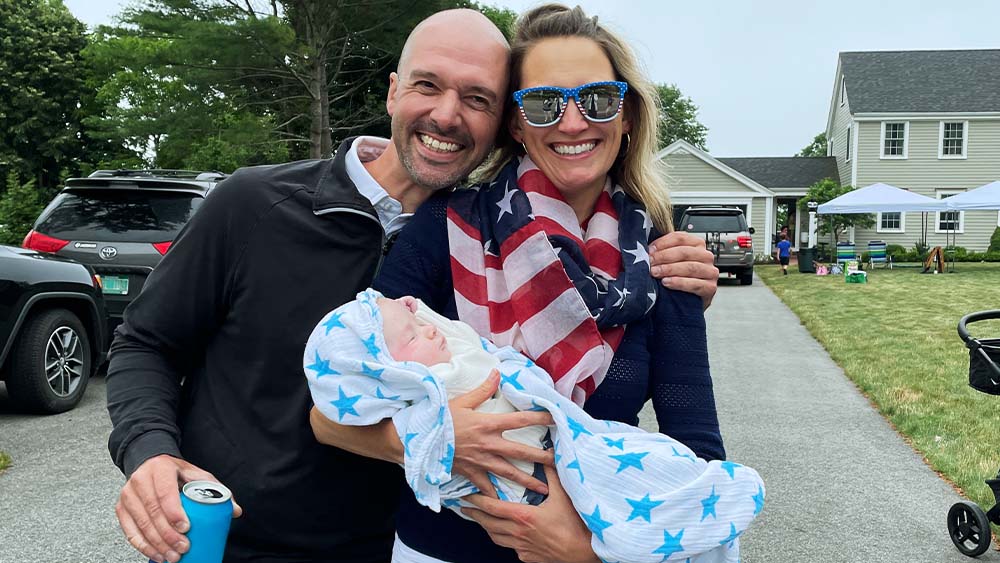
Raina Gay Leahy and her partner, Erik, welcomed baby Calvin into their family in April 2021. She took part in Edlow’s research and other studies, too. Photo courtesy of Cheryl Gleason.

Raina Gay Leahy and her partner, Erik, welcomed baby Calvin into their family in April 2021. She took part in Edlow’s research and other studies, too. Photo courtesy of Cheryl Gleason.
Making Decisions About Vaccination: Two Stories
Getting vaccinated as soon as possible is the safest choice for most pregnant people and their babies. The Centers for Disease Control and Prevention now encourages all pregnant people to get vaccinated to protect themselves from COVID-19.
In July 2021, two major professional societies dedicated to pregnancy care strongly recommended that pregnant people be vaccinated to protect them from COVID-19.3 The groups relied on data from several studies, including Edlow’s, as well as information from more than 139,000 people who reported being pregnant when they were vaccinated.4
However, many pregnant people — including Clark — had to decide about vaccination before any data were available. Clark explained her reasons for getting Moderna vaccine doses in early 2021.
“I’d already gotten the flu vaccine while I was pregnant and didn’t have any reaction,” Clark said. “My doctor thought that the risks of the mRNA vaccines would be low, because few problems had been seen among the many people who had been vaccinated. As a first-line care provider, I was much more concerned about getting COVID-19 than the vaccine,” Clark recalled.
Raina Gay Leahy, Ph.D., also participated in Edlow’s study. Leahy is an associate director for clinical operations at a pharmaceutical company, managing clinical trials for treatments for a rare condition called hereditary transthyretin amyloidosis. Leahy got the news that she was pregnant with her third child during the summer of 2020. She opted to get vaccinated as soon as she was eligible in early 2021.
“SARS-CoV-2 is a weird virus that has unexpected health effects. Based on my scientific background and the information I’d read about the vaccines, I felt confident about their safety, even for pregnant people,” Leahy said. “I’d rather put up with some flu-like side effects and a sore arm from vaccination than face the risk of lung infections, blood-clotting problems, and pregnancy complications that COVID-19 can cause.”
Leahy hopes that Edlow’s study results will reduce concerns about vaccination during pregnancy.
“Having scientific evidence that the vaccines work during pregnancy and knowing that a mother’s antibodies may protect her newborn will encourage more pregnant women to get vaccinated,” Leahy said.
“Pregnant women want information that’s specific to pregnancy, and they need to have access to the same medical care and research as any other group.” —Andrea G. Edlow, M.D., M.Sc.
Opening Study Participation to Pregnant People
Edlow’s study shows that for most pregnant people, getting vaccinated as soon as possible is the safest choice.
“It was reassuring to know that the vaccine protected me from COVID-19,” Clark said. “But when we learned that our baby was probably protected by my vaccine antibodies, that was amazing.”
This encouraging research was possible because pregnant people like Clark and Leahy volunteered to participate. Since the study team included Edlow, an obstetrician and a research advocate in pregnancy, pregnant people could participate. Some studies of COVID-19 vaccines are now enrolling pregnant women.
“Pregnant women want information that’s specific to pregnancy, and they need to have access to the same medical care and research as any other group,” Edlow said. “Research teams should include obstetricians to support the participation of pregnant women and ensure that the benefits of research are available to all.”
Update: April 1, 2022
This story was originally published September 13, 2021.
As Edlow and her fellow researchers continue to monitor the health of mothers and babies in the study, they are learning even more about how vaccination protects pregnant people and their infants from COVID-19.
In new data published in February 2022, the researchers showed that:
-
At the time of delivery, mothers who were vaccinated with mRNA vaccines while pregnant had levels of protective antibodies three times higher than mothers who got sick with COVID-19 while pregnant.
-
Serum samples were collected from 28 babies born to vaccinated mothers. Sixteen of those babies (57%) still had antibodies against COVID-19 in their systems when they were 6 months old.
-
Serum samples were also collected from 12 babies born to mothers infected with SARS-CoV-2 during pregnancy. Only one of those babies (8%) still had antibodies at age 6 months.
It’s likely that the antibodies protect babies from getting COVID-19, but the scientists don’t have enough data yet to know for sure whether that’s true. The additional study results do offer hope to parents for two reasons. First, babies less than 6 months old have the highest risk of severe symptoms if they get infected with SARS-CoV-2.5,6 Antibodies from their vaccinated mothers may lower babies’ risk of severe disease. Second, knowing that young babies have antibodies from their moms that last 6 months — maybe longer — may help relieve parents’ concerns about how to keep young babies healthy. This is especially true since there are no plans for COVID-19 vaccines for children younger than 6 months old.
The CDC continues to encourage anyone considering pregnancy or who is pregnant to get vaccinated as soon as possible.
Sources
- Gray, K. J., Bordt, E. A., Atyeo, C., Deriso, E., Akinwunmi, B., Young, N., Baez, A. M., Shook, L. L., Cvrk, D., James, K., De Guzman, R., Brigida, S., Diouf, K., Goldfarb, I., Bebell, L. M., Yonker, L. M., Fasano, A., Rabi, S. A., Elovitz, M. A., Alter, G., & Edlow, A. G. (2021). Coronavirus disease 2019 vaccine response in pregnant and lactating women: a cohort study. American Journal of Obstetrics and Gynecology, S0002-9378(21)00187-3. Advance online publication. https://doi.org/10.1016/j.ajog.2021.03.023
- Metz, T. D., Clifton, R. G., Hughes, B. L., Sandoval, G., Saade, G. R., Grobman, W. A., Manuck, T. A., Miodovnik, M., Sowles, A., Clark, K., Gyamfi-Bannerman, C., Mendez-Figueroa, H., Sehdev, H. M., Rouse, D. J., Tita, A. T. N., Bailit, J., Costantine, M. M., Simhan, H. N., & Macones, G. A.; Eunice Kennedy Shriver National Institute of Child Health and Human Development (NICHD) Maternal-Fetal Medicine Units (MFMU) Network (2021). Disease severity and perinatal outcomes of pregnant patients with coronavirus disease 2019 (COVID-19). Obstetrics & Gynecology, 137(4), 571–580. https://doi.org/10.1097/AOG.0000000000004339
- American College of Obstetricians and Gynecologists. (2021, July 30). ACOG and SMFM recommend COVID-19 vaccination for pregnant individuals. Retrieved September 10, 2021, from https://www.acog.org/news/news-releases/2021/07/acog-smfm-recommend-covid-19-vaccination-for-pregnant-individuals.
- Centers for Disease Control and Prevention. (2021). V-safe COVID-19 vaccine pregnancy registry. Retrieved September 10, 2021, from https://www.cdc.gov/coronavirus/2019-ncov/vaccines/safety/vsafepregnancyregistry.html.
- Hobbs, C. V., Woodworth, K., Young, C. C., Jackson, A. M., Newhams, M. M., Dapul, H., Maamari, M., Hall, M. W., Maddux, A. B., Singh, A. R., Schuster, J. E., Rowan, C. M., Fitzgerald, J. C., Irby, K., Kong, M., Mack, E. H., Staat, M. A., Cvijanovich, N. Z., Bembea, M. M., Coates, B. M., … Overcoming COVID-19 Investigators (2022). Frequency, Characteristics and Complications of COVID-19 in Hospitalized Infants. The Pediatric infectious Disease Journal, 41(3), e81–e86. https://doi.org/10.1097/INF.0000000000003435
- Bhuiyan, M. U., Stiboy, E., Hassan, M. Z., Chan, M., Islam, M. S., Haider, N., Jaffe, A., & Homaira, N. (2021). Epidemiology of COVID-19 infection in young children under five years: A systematic review and meta-analysis. Vaccine, 39(4), 667–677. https://doi.org/10.1016/j.vaccine.2020.11.078
 An official website of the United States government
An official website of the United States government

